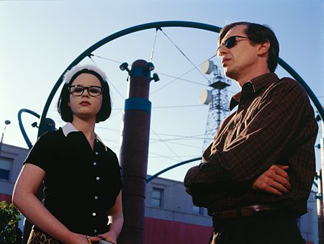Fringe Dwellers
Birch and Buscemi Are Offbeat Misfits Set Adrift in 'Ghost World'
By Patrick Reed

Thora Birch and Steve Buscemi bring Clowe's comic to life.
Daily life in the U.S.A. circa 2001 is a broken record for the principal characters of Ghost World. Think of the worst record you can, the most bland and chipper and popular - "You Light Up My Life," perhaps, or "Don't Worry, Be Happy" - and loop it over and over to where it becomes inescapable. Externalize that feeling outward into your living, breathing surroundings, and you'll have a sense of what the people in Ghost World endure. Based on the 1997 book by underground comic-strip artist Daniel Clowes, and set in the teenage wasteland of greater Los Angeles, Terry Zwigoff's film opens up and embraces those who shun the mass mind(less)set and wearily tread the road less traveled. According to Ghost World's often convincing logic, these clique-forming outcasts that exist on the fringes of modern America are, collectively, the last remaining people of interest and vitality in our increasingly embalmed society.
Ghost World is Zwigoff's first film since his universally-praised documentary Crumb (1994), which cast a wide, revealing net over the life, art, and relationships of the 60s counterculture icon and comic-illustrator pioneer, R. Crumb. This time, Zwigoff adapts a vision from one of Crumb's worthy successors - since the mid-eighties, Daniel Clowes has churned out a series of bizarre and often hysterically acute observations on the weirdness of contemporary life. His original book focused on two late teens named Enid and Rebecca who feel completely alienated from their tedious environment. Clowes and Zwigoff collaborated on the screenplay for this film version, which extends beyond the girls' experiences and takes on other misshapen, fascinating lives as well.
Unlike the majority of their shiny happy high school grads, central character Enid (Thora Birch, so good in American Beauty [2000] and better here) and Rebecca (Scarlett Johansson, the injured daughter in The Horse Whisperer [1998]) abhor the idea of continuing on to college. Enid especially seems shut off from the outside world. In diners, on sidewalks, and practically everywhere else, Enid argues loudly and often with anyone she encounters, even with her ostensible kindred spirit Rebecca, who has a more practical - though no less sarcastic - outlook on life. Enid searches everywhere for signs of originality and passion, and although vintage punk rock records and deliriously tacky Indian movies offer some private pop-culture solace amidst the Starbucks-filled outer terrain, the people she encounters in her wandering are all loud-but-empty vessels until she meets Seymour.
At first the hapless victim of a singles-ad set-up scam by Enid and Rebecca, Seymour (Steve Buscemi) soon becomes an unlikely role model for Enid. A much older, mantis-postured single guy who avidly collects early twentieth-century music on mint-condition 78 RPM vinyl (sound a bit like R. Crumb, anyone?) Seymour seems just as desperately alone as Enid is. Their bond is at the heart of Ghost World, and it's one of the more distinctive couplings to come along in American film for quite a while. Here are two people that are drawn to each other - more her to him actually, which proves to be a big problem - by actual similarities instead of some hackneyed sexual attraction or "true love." They share a fondness for tweaking earnest political correctness (which provides some of Ghost World's comedic high points but also one of it's more ludicrous plot twists) as well as for the otherworldly pleasures of Skip James's "Devil Got My Woman," and although their offbeat relationship is seemingly over by the film's end, the flashes of connection that occur between Enid and Seymour offer just enough hope for non-conformists everywhere to keep beating back the tides of conventional society and do their own thing. (Buscemi is damn near note-perfect as the sad-sack Seymour. Forget his limiting, "weirdo" roles in big-budget actioners like Con Air [1997] and the execrable Armageddon [1998]. This performance is on par with ones from his long list of independent-film highlights, starting with Mystery Train [1989] and going on through to Living In Oblivion [1995] and his own Trees Lounge [1996], with many stops in between.)
Zwigoff's celluloid translation of Ghost World maintains Clowes's caustic worldview - especially during the early interplay between Enid and Rebecca - but there's also another, more melancholy sentiment present. Just as Crumb cast a sympathetic eye toward the eccentricities of R. Crumb and his family (especially his troubled brother Charles), Zwigoff similarly admires the struggling denizens of Ghost World for the quiet way they, intentionally or unavoidably, defy society's constant pressure to conform. Those who aren't familiar with Clowes's original concept but have enjoyed other perceptive explorations of teen alienation like Richard Linklater's adaptation of Eric Bogosian's SubUrbia (1996), or for that matter, Linklater's 1991 trend-setting Slacker (with it's immortal line, "Withdrawal in disgust is not the same as apathy" - an Enid-worthy dictum if there ever was one) will find much to admire - and relate to - in Ghost World.
Ghost World will open Friday, Sept. 28 at the Kentucky Theatre. Call 231-6997 for info.
HOME | THIS ISSUE | ACE ARCHIVES